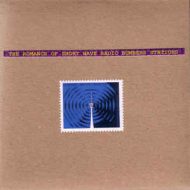
Over the years, numbers stations have provided a source of considerable fascination to musical artists, particularly those ploughing more experimental or ambient furrows. The lo-fi, crackly nature of the synthetic human voices listing out mysterious strings of numbers on obscure frequencies are at once both compelling, haunting and strangely bleak. The fact that no-one really knows for sure why they are being broadcast only adds to the mystique (though the smart money is of course on shortwave code broadcasts for espionage purposes, though many of them are probably automated and still chugging away long after obsolescence).
Put simply, they’re pretty much made to be sampled and artists from Boards of Canada to Stereolab to Porcupine Tree have included snippets of these broadcasts within their recordings. David Tibet associate Raymond Russell has decided to go one step further and dedicate an entire full-length release to celebrating these unusual soundscapes. His chosen method of accompanying the numbers station samples is by simple, sparse piano – minimalist pieces composed to at once both complement and underpin the stories only hinted at in the track titles.
We are treated to wispy hints of other lives and emotional states on reflective pieces such as ‘The Quiet Woman of Montevideo’ and ‘Adventures in the Inonosphere’ whilst a sense of urgency plays across the spidery work on ‘Radio Traffic, 3am’. Elsewhere, more sinister ambiences and note choices swirl across ‘The Man from Haarlem’ (sic) and ‘A Boarding House, Union City’ whereby the crusty samples are blended intriguingly with Russell’s effectively simply keywork. There’s a definite atmosphere here of snapshots of lives, of the briefest glimpses of low-key characters and places who’s very normality gives weight to the possibility of espionage.
As you’ve probably guessed, this is a far-cry from the usual Ave Noctum fare but is none the less intriguing for it. Having been mildly fascinated by numbers stations for a little while now, it is heartening to witness an artist fully embrace the concept to become a source of inspiration to sustain a full-length. If anything, I would like to have heard more done with the samples themselves, to have them more fully integrated into the fabric of the pieces. In addition, Russell seems to play up to a more light-hearted interpretation of the stations (‘Party in El-Zaytoun’ is effectively a jig) whereas from a personal perspective, I have always found something slightly eerie about these broadcasts. Emphasising this aspect of them more fully would have injected more ‘darkness’ into the album and would have been welcomed by these ears.
Nevertheless, if the idea of cold-war code-generating machines continuing to churn away ancient messages of long-forgotten missions across the void of short-wave radio intrigues, this record is definitely worth dipping into. ‘The Romance of Short-Wave Radio’ isn’t particularly romantic but it is certainly an interesting conceptual piece.
(7/10 Frank Allain)

Leave a Reply